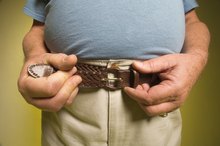What does fact checked mean?
At Healthfully, we strive to deliver objective content that is accurate and up-to-date. Our team periodically reviews articles in order to ensure content quality. The sources cited below consist of evidence from peer-reviewed journals, prominent medical organizations, academic associations, and government data.
- Harvard School of Public Health: Health Gains from Whole Grains
- MedlinePlus: Carbohydrates
- U.S. Centers for Disease Control and Prevention: Carbohydrates
- MayoClinic.com: Added Sugars: Don't Get Sabotaged by Sweeteners
The information contained on this site is for informational purposes only, and should not be used as a substitute for the advice of a professional health care provider. Please check with the appropriate physician regarding health questions and concerns. Although we strive to deliver accurate and up-to-date information, no guarantee to that effect is made.
What Are Unprocessed Carbohydrates?
Few dietary components inspire debate like carbohydrates 2. As food fads change, topics such as good carbs, bad carbs, processed carbs, slow carbs and refined carbs pollute the nutritional landscape and confuse our relationship with this essential nutrient. All types of carbs can play a role in a healthy diet, but your best bet is to choose unprocessed carbs most of the time, according to the Harvard School of Public Health 1.
Definition
Unprocessed carbs refer to carbohydrates that haven't been broken down or made into other foods 2. These complex carbohydrates and nutritious simple carbohydrates contain more fiber, vitamins and minerals than their processed counterparts and typically have less of an impact on your blood sugar 2. Processed carbs, such as refined white flour and white sugar, have less fiber, and your body converts them into glucose quickly. Consuming too many processed grains is linked to obesity, heart disease and diabetes, according to the Harvard School of Public Health 1.
Whole Grains
What Food Groups Are Carbohydrates Found in?
Learn More
Whole grains are a source of unprocessed carbohydrates 2. Whole grains have not been stripped of their hull or processed to remove the fiber. A form of complex carbohydrates, whole grains take longer to break down and digest 12.
Fresh Fruits, Vegetables and Legumes
Fresh vegetables, fruits and legumes count as unprocessed carbohydrates 2. Starchy vegetables and legumes are considered complex carbohydrates and work in your body much like whole grains 2. Fruits and vegetables are considered simple carbohydrates because their sugars break down more easily 2. When they're fresh or minimally altered, they contain fiber and a wide variety of vitamins, minerals and phytochemicals. Processing them into juices, jams, pies, candies and other foods typically removes the fiber and strips away the nutrients.
Sugars
List of Slow & Fast Carbs
Learn More
Sugars are a type of carbohydrate and can also be divided into processed and unprocessed types. Unprocessed sugars occur naturally in foods such as fruits, vegetables and milk. These sugars, called lactose and fructose, don't need to be avoided, the MayoClinic.com says, because:
- they're derived from healthy
- nutritious foods 3
Added sugars are the types of processed sugars you need to look out for. Unprocessed sugars have been created by food manufacturers and include high fructose corn syrup and table sugar. Processed sugars are typically found in candies and desserts. Too many processed or added sugars in your diet leads to obesity, chronic disease, tooth decay and poor nutrition, according to MayoClinic.com 3. Limit added sugar consumption to less than 15 percent of your total calories.
- Sugars are a type of carbohydrate and can also be divided into processed and unprocessed types.
- These sugars, called lactose and fructose, don't need to be avoided, the MayoClinic.com says, because: * they're derived from healthy
* nutritious foods 3 Added sugars are the types of processed sugars you need to look out for.
Related Articles
References
- Harvard School of Public Health: Health Gains from Whole Grains
- MedlinePlus: Carbohydrates
- MayoClinic.com: Added Sugars: Don't Get Sabotaged by Sweeteners
- Hervik AK, Svihus B. The Role of Fiber in Energy Balance. J Nutr Metab. 2019;2019:4983657. doi:10.1155/2019/4983657
- U.S. Department of Health and Human Services and U.S. Department of Agriculture. 2015–2020 Dietary Guidelines for Americans. 8th Edition. Published December 2015.
- Gibson AA, Sainsbury A. Strategies to Improve Adherence to Dietary Weight Loss Interventions in Research and Real-World Settings. Behav Sci (Basel). 2017;7(3). doi:10.3390/bs7030044
- Institute of Medicine of the National Academies, Food and Nutrition Board. Dietary Reference Intakes for Energy, Carbohydrate, Fiber, Fat, Fatty Acids, Cholesterol, Protein, and Amino Acids. The National Academies Press. 2005.
- Dietary Guidelines 2015–2020. Office of Disease Prevention and Health Promotion. https://health.gov/dietaryguidelines/2015/guidelines/chapter-2/a-closer-look-at-current-intakes-and-recommended-shifts/#food-groups
- Harvard Men's Health Watch. Carbohydrates in Your Diet: It's the Quality That Counts. Harvard Health Publishing. 2014.
Writer Bio
A Jill-of-all-trades, Lillian Downey is a certified Responsible Sexuality Educator, certified clinical phlebotomist and a certified non-profit administrator. She's also written extensively on gardening and cooking. She also authors blogs on nail art blog and women's self esteem.








